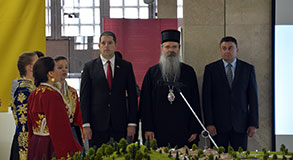Đurić: We remain committed to normalization of relations with Priština
Director of the Office for Kosovo and Metohija Marko Đurić stated that Serbian Government remains committed to the normalization of relations between Belgrade and Priština, noting that the First Agreement on Normalization of Relations, signed in Brussels two years ago, is the basis of the positive changes aimed at more certain and prosperous future for all the nations in the region.

On the occasion of the second anniversary of the signing of the Brussels Agreement, Đurić told the Beta news agency that Serbia is fully implementing all agreements and obligations stemming from the process of the technical and political dialogue.
Serbia hopes that the EU will be, above all, an earnest partner who understands the needs of the Serbian people to provide for themselves the political, security, institutional and social frameworks which could guarantee the minimum of conditions for a sustainable development, survival and return to Kosovo and Metohija, said Đurić.
"We are confident that the EU, where Serbia sees the common future of the region, understands and realizes this. Hence the firm commitment of the Serbian side to the underlying principles of the First Agreement and the related arrangements on energy, telecommunications, freedom of movement and other issues, along with our commitment to the establishment of the Community of Serbian Municipalities in its full capacity, and the continuation of dialogue", Đurić said.
Đurić explained that Serbia is committed to the verbatim implementation of the First Agreement, the Implementation Plan and all related documents, stemming from the hitherto process of the dialogue.
However, Đurić forewarned that despite the evident progress, the lingering impression is that the dialogue is still heavily saddled with the negative reflections from several important developments.
Đurić furhter explained that the Brussels dialogue is negatively affected by the deviations in the dynamics of implementation of the First Agreement, which is clearly defined in the Implementation Plan, as well as by the apparent lack of leadership on the ground on the part of facilitator of negotiations, as well as of other international missions in Kosovo and Metohija, in the matter of full implementation of the agreed.
The third threat to the dialogue, as he explained, are constant attempts of Priština to involve the issue of status in all topics brought to table in Brussels, which is in direct contravention to the status-neutral form of the negotiations, as agreed at the very beginning of the dialogue.
Finally, Đurić explained that the process is negatively affected by the lack of clear incentives for the parties involved in the dialogue, and above all by the uncertain dynamics of European integrations.





